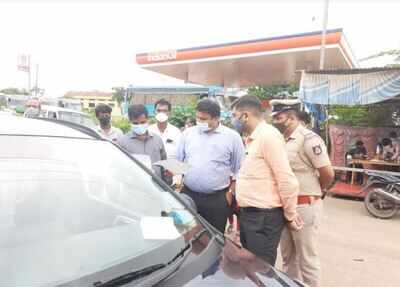- News
- City News
- mangaluru News
- RT-PCR negative certificate mandatory to enter Dakshina Kannada from Kerala
RT-PCR negative certificate mandatory to enter Dakshina Kannada from Kerala

After the Delta variant of Covid-19 was detected in Kerala, the Dakshina Kannada district administration introduced stricter border surveillance from Monday. RT-PCR negative results not earlier than 72 hours will be mandatory for all those from Kerala entering Karnataka via various borders of the district.
MANGALURU: After the Delta variant of Covid-19 was detected in Kerala, the Dakshina Kannada district administration introduced stricter border surveillance from Monday. RT-PCR negative results not earlier than 72 hours will be mandatory for all those from Kerala entering Karnataka via various borders of the district.
Deputy commissioner Dr KV Rajendra said measures were taken to check all vehicles entering the district through various border roads as per the state government’s order.
“Along with a spike in Covid-19 cases, Kerala also has been reporting Delta variant of the virus. In this backdrop, the state government has issued an order to make surveillance strong on the Kerala – Karnataka borders. Accordingly, directions have been given to strengthen check posts on the inter-state border. Hence, Talapady, Nettanige Mudnooru, Saradka, Jalsoor and all other check posts will have 24x7 surveillance to check unnecessary movement of people,” the DC said.
Gram panchayats in the border areas have also been asked to set up checkpoints.
“Since the district receives patients from Kerala, we have directed all hospitals here to conduct RT-PCR tests for patients and their bystanders. We have also opened swab collection centres at borders and deployed police forces too. Those entering Karnataka through the district’s borders should compulsorily bring RT-PCR negative certificates. While the positivity rate in Dakshina Kannada is below 5%, Kerala has been reporting more than 10%. Hence, to prevent the possibility of a third wave and reduce the number of cases, we have made border surveillance stronger,” he added.
Deputy commissioner Dr KV Rajendra said measures were taken to check all vehicles entering the district through various border roads as per the state government’s order.
“Along with a spike in Covid-19 cases, Kerala also has been reporting Delta variant of the virus. In this backdrop, the state government has issued an order to make surveillance strong on the Kerala – Karnataka borders. Accordingly, directions have been given to strengthen check posts on the inter-state border. Hence, Talapady, Nettanige Mudnooru, Saradka, Jalsoor and all other check posts will have 24x7 surveillance to check unnecessary movement of people,” the DC said.
Gram panchayats in the border areas have also been asked to set up checkpoints.
“Since the district receives patients from Kerala, we have directed all hospitals here to conduct RT-PCR tests for patients and their bystanders. We have also opened swab collection centres at borders and deployed police forces too. Those entering Karnataka through the district’s borders should compulsorily bring RT-PCR negative certificates. While the positivity rate in Dakshina Kannada is below 5%, Kerala has been reporting more than 10%. Hence, to prevent the possibility of a third wave and reduce the number of cases, we have made border surveillance stronger,” he added.
FacebookTwitterLinkedinEMail
Start a Conversation
end of article
Quick Links
Delhi Air PollutionDelhi TemperatureChennai WeatherBangalore TemperatureCovid vaccination centres in DelhiCoronavirus in DelhiRTPCR test in GurgaonHyderabad RainPollution level in BangaloreDelhi SmogDelhi TemperatureNoida AQIGurgaon AQI todayFire in MumbaiMumbai RainsCovid 19 RT PCR Test in NoidaDelhi AQI todaySrinagar encounter
